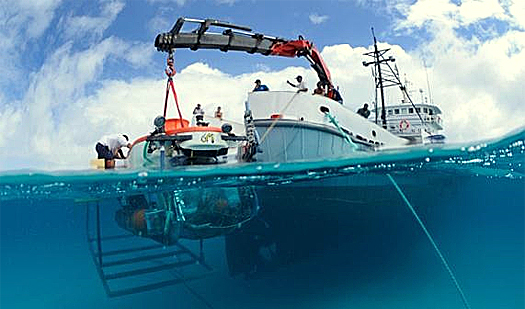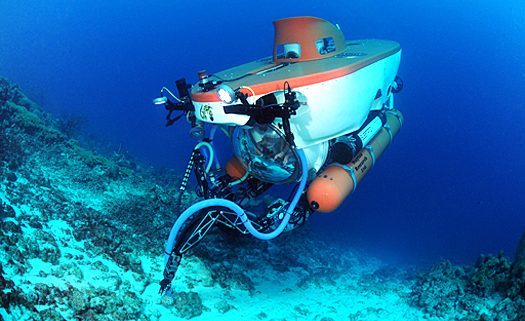Research institute Imares maps Bonaire's deep reef biodiversity hotspot with submarine
 Researchers Erik Meesters en Lisa Becking of the Dutch Institute for Marine Resources & Ecosystem Studies (Imares) started to explore the deep reef of Bonaire, an island in the Dutch Caribbean.
Researchers Erik Meesters en Lisa Becking of the Dutch Institute for Marine Resources & Ecosystem Studies (Imares) started to explore the deep reef of Bonaire, an island in the Dutch Caribbean.
In their Curasub submarine they will map the biodiversity, taking samples and examining the bacteria that are found in sponges.
The two Imares researchers work together with Detmer Sipkema, Microbiologist at Wageningen University, and with taxonomists of Naturalis, Leiden.
Very clear water
Bonaire’s coral reef is famous and a true tourist attraction. The water around the reef is clear. Stony corals, which depend on light to grow, can appear at sixty meters below the surface if the water is clear enough. But with regular diving equipment researchers can only go as deep as forty meters. The Curasub, a submarine of the Curaçao Sea Aquarium, enables Meesters and Becking to explore the deeper reef.
Exceptional biodoversity
The deep reef of Bonaire will be explored for the very first time. The shallow reefs of the Caribbean are considered a biodiversity-hotspot, an area with exceptional diversity of plants, animals and ecosystems, yet surprisingly little is known about the flora and fauna of the deep reefs. It is expected that many new species to science will be found at these practically unexplored depths.
The Dutch Ministry of Economic Affairs (EZ) has commissioned to study the deeper reef as part of the exclusive Economic Zone management plan for the Dutch Caribbean.
Beyond photic zone
Erik Meesters and Lisa Becking from Imares will board the Curasub submarine, based at the Curaçao Sea Aquarium, to go down to depths of 300m. The exploration will go beyond the photic zone (+/- 200m) where creatures have found solution to life in the dark as well as to great pressure from a bulk of water.
Using cameras and collecting biological specimens they will document this fascinating ecosystem and its unique biodiversity.

Collecting samples
The collected species will be identified by taxonomists of the Zeeteam at Naturalis Biodiversity Center and the state of the art molecular lab of Naturalis will generate DNA-barcodes to facilitate the identification.
Detmer Sipkema of WUR will assess the microscopic diversity of microbes that are key to a variety of ecological processes.
Data for sustainable management plan
The aim of the expedition is to gain a first assessment of the biodiversity of the deep reef of Bonaire. This information is essential to adequately protect the ecosystem and construct sustainable management plans. In order to protect biodiversity, we need to know what is down there and to gain an understanding what processes keep it in place. This expedition is the first dive into the unknown world of the deep reefs of Bonaire.
This news item was originally published on the website of Imares Wageningen UR, Laboratory of Microbiology.
More information
IMARES Wageningen UR, Laboratory of Microbiology
Wageningen/Den Burg, the Netherlands
+31 317 48 71 01
www.wageningenur/nl/imares



